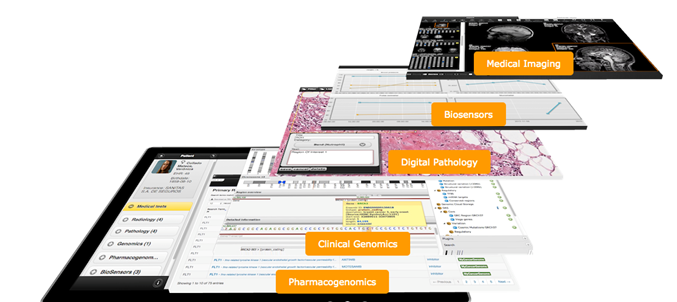Enabling precision medicine with integrated genomic and clinical data
Precision medicine tailors a patient's medical treatment by factoring in their genetic makeup and clinical data. The key to applying this methodology is integrating clinical data with an individual’s genomic data for the most complete longitudinal healthcare record to power the most precise and effective treatment.
Problem: data in silos, detached from the point of care
Currently, clinical information resides in silos (elecftronic healthcare records, radiological information systems, laboratory information systems, and picture archiving and communication systems), with little to no integration or interoperability between them. Furthermore, there is not just one genome for a patient, but multiple “omes” including the genome, proteome, transcriptome, epigenome, and microbiome and beyond. The lack of availability of a complete, integrated longitudinal patient record incorporating multiomics to power precision medicine has several detrimental effects. First and foremost, it results in less effective medicine, and suboptimal patient outcomes. It can also delay diagnoses where data required to support a clinical decision is not readily available. Working with an incomplete medical record can increase the risk of errors. Last but not least, this can exacerbate the lack of coordination across multidisciplinary care teams, resulting in suboptimal patient care and increased healthcare costs. For precision medicine, this presents a significant challenge around how to integrate clinical data systems and clinical genomic data. The cumulative result is the reduced feasibility of providing precision medicine at the point of care.
The solution: seamless connection of clinical data with genomic data
Kanteron Systems Platform is a patient-centric, workflow-aware, precision medicine solution. The solution integrates many key types of healthcare data for a complete patient longitudinal record to power precision medicine including medical imaging, digital pathology, clinical genomics, and pharmacogenomic data.
The figure below shows key data layers of the Kanteron Platform:
Benefits
The solution provides several key benefits to help fulfill the potential of precision medicine. First, it provides a clinical content management system across the full range of data types comprising the patient record. With the cost of full genomic sequencing now dipping below the $1,000 USD mark, a tsunami of genomic data is expected. Each genome record can take up to 150 GB or more of storage. The Kanteron Platform provides support for managing this massive growth in genomic data and paves the way for genomic sequencing at scale. Through the integration of data and support for multiomics, this solution can also be used to enable pharmacogenomics, in turn helping to increase medication efficacy and reduce adverse events. Artificial intelligence and machine learning are most powerful when applied to the full patient record, across the range of data types comprising this record. Through integration of key data types, the Kanteron Platform enables healthcare organizations to realize the full potential of artificial intelligence to improve patient outcomes and reduce healthcare costs.
Azure services that make a difference
Azure offers Kanteron’s customers a level of flexibility, scalability, security, and compliance that is not possible with on-premises installations. Azure is also available across 54 regions and 140 countries worldwide, and just expanded into South Africa, enabling healthcare organizations to deploy where required and satisfy any applicable data sovereignty requirements. Azure supports a vast range of compliance requirements as seen in the Compliance offerings. We now have 91 certifications and attestations. Key Azure services used to support the Kanteron Platform include both Azure Storage, and Virtual Machines.
Recommended Next steps
Explore how the Kanteron Systems Platform can power your precision medicine practice to the next level through integration of genomic and clinical data, and support for advanced artificial intelligence.
Source: Azure Blog Feed

